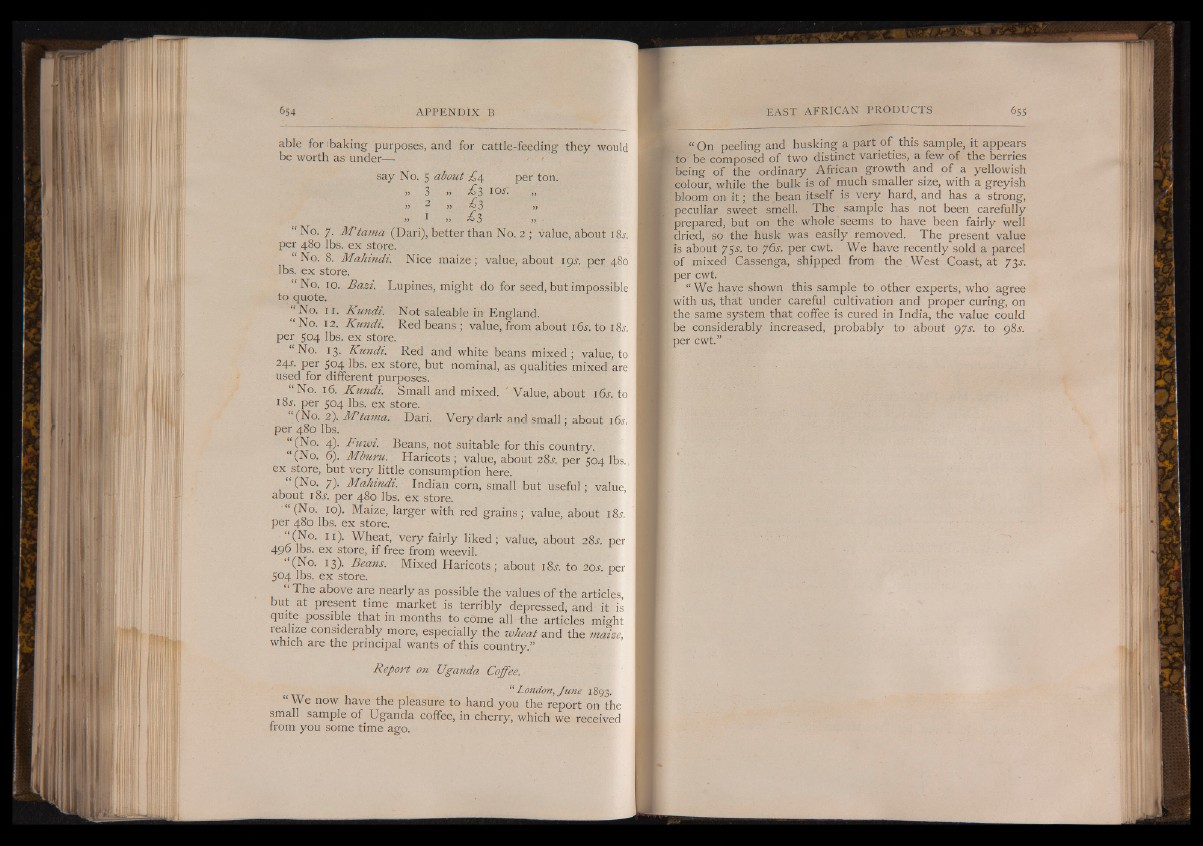
able for ¡baking purposes, and for cattle-feeding they would
be worth as under—
say No. 5 about £4 per ton.
» 3 » F 3 ^ os. ■
» 2 ,, £3 , ,
jj ^ » £ 3 » -
I No. 7. M'tama (Dari), better than No. 2 ; value, about i8r.
per 480 lbs. ex store.
“ No. 8. Mahindi. Nice maize; value, about 19^. per 480
lbs. ex store.
“ No. 10. Bazt. Lupines, might do for seed, but impossible
to quote.
“ No. 11. Kundi. Not saleable in England.
‘ No. 12. Kundt. Red beans ; value, from about 16s. to l8r.
per 504 lbs. ex store.
“ No. 13. Kundt. Red and white beans mixed; value,rto
24-f. per 504 lbs. ex store, but nominal, as qualities mixed are
used for different purposes.
“ No. 16. Kundi. Small and mixed. ' Value, about iórvto
i8r. per 504 lbs. ex store.
“ (No. 2). M'tama. Dari. Very dark and small ; about 16s.
per 480 lbs.
^ (No. 4)- Fuwt. Beans, not suitable for this country.
“ (No. 6). Mburu. Haricots; value, about 28s. per 504 lbs.,
ex^ store, but very little consumption here.
“ (No. 7). Mahindi. Indian corn, small but useful; value,
about i8r. per 480 lbs. ex store.
"(No 10). Maize, larger with red grains; value, about i8x
per 480 lbs. ex store.
(No. 11). Wheat, very fairly liked; value, about 28s. per
49b lbs. ex store, if free from weevil.
(No. 13). Beans. Mixed Haricots; about i8r. to 20s. per
504 lbs. ex store. -
The above are nearly as possible the values of the articles,
but at present time market is terribly depressed, and it ’is
quite possible that in months to cOme all the articles might
realize considerably more, especially the wheat and the maize,
which are the principal wants of this country.”
Report on: Uganda Coffee.
“ London, June 1893.
“ We now have the pleasure to hand you the report on the
small sample of Uganda coffee, in cherry, which we received
from you some time ago.
| On peeling and husking a part of this sample, it appears
to be composed of two distinct varieties, a few of the berries
being of the ordinary African growth and of a yellowish
colour, while the bulk is of much smaller size, with a greyish
bloom on i t ; the bean itself is very hard, and has a strong,
peculiar sweet smell. The sample has not been carefully
prepared, but on the whole seems to have been fairly well
dried, so the husk was easily removed. The present value
is about 7 Jr. to 76s. per cwt. We have recently sold a parcel
of mixed Cassenga, shipped from the . West Coast, at 73s.
per cwt.
1 We have shown this sample to other experts, who agree
with us, that under careful cultivation and proper curing, on
the same system that coffee is cured in India, the value could
be considerably increased, probably to about 97 s. to 98s.
per cwt.”